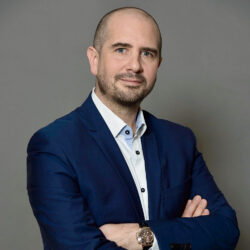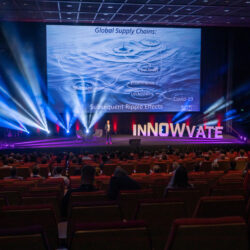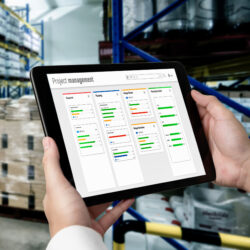Reckitt’s Sami Naffakh heads the Top 28 Supply Chain Executives Europe 2022 ranking

Sami Naffakh, Chief Supply Officer at Reckitt in the United Kingdom, has taken the number 1 spot in the 2022 edition of the Top 28 Supply Chain Executives Europe, climbing from second place in the 2021 ranking. Naffakh: “In the middle of a pandemic, we were able to scale up product supply dramatically when needed and achieved significant performance improvements with our major customers, getting them product on time and at the right levels.”
Sami Naffakh has more than 25 years of broad international leadership experience in fast-moving consumer goods (FMCG) companies such as Unilever, Danone and Estée Lauder, as well as within Reckitt. Since 2020 he has been Chief Supply Officer and Member of the Executive Board at Reckitt, where he is responsible for the end-to-end supply chain globally. Over the past two years, his focus has been on navigating through the multiple and successive disruptions confronting supply chains worldwide. Meanwhile, he is driving a major transformation in the Reckitt supply operations aimed at becoming responsible and purpose-driven, with a strong focus on ESG, resilience, leading-edge performance, efficiency and effectiveness, and future-proof (with a specific emphasis on digitalization).
Top 28
To assess the strategic performance of European supply chain leaders, Supply Chain Media, KPMG Advisory and executive recruitment agency Inspired-Research jointly compiled the eighth edition of the Top 28 Supply Chain Executives Europe. This ranking is based on four dimensions: financial results, personal responsibility, personal visibility and peer votes. Additionally, to be included in the list, executives must have been in their current position for at least one year.
Supply Chain Media and KPMG Advisory used several financial metrics to analyse this year’s financial results. Given the huge supply chain fluctuations during the pandemic and the severe shortages in the second half of 2021, return on capital employed (ROCE) was identified as the most crucial key performance indicator (KPI) for supply chains this year.
Perhaps unsurprisingly, its successful coronavirus vaccine meant that pharmaceutical manufacturer Pfizer scored highest in the 2021 financial analysis, with Adidas achieving a very commendable second place. Ivanka Janssen of Philips received the highest personal visibility score, but dropped in the Top 28 ranking due to the health technology company’s disappointing financial results. Four female executives have disappeared from the Top 28 because of career changes: Francesca Gamboni (from Stellantis to Accell Group), Stephanie Rott (from LVMH to Guerlain), Isabelle Conrot (from Roche to Gartner) and Silke Maurer (no longer at BSH Home Appliances). Likewise, David Prinselaar (Akzo Nobel), Gustavo Burger (Kraft Heinz Company), Volker Schmitz (HP) and Sikko Zoer (Medtronic) are no longer in the ranking due to career moves, while Bruce Edwards of Kellogg Company has dropped out of this year’s Top 28.
Turmoil forces supply chain executives to make clear choices
At the end of 2020, according to 33 European supply chain executives surveyed by Supply Chain Media, digitalization was the most important megatrend affecting their businesses in the long term, with sustainability a distant second. Since then, however, the war in Ukraine has drastically changed the world from a political and military perspective, and therefore also from a business and supply chain perspective. Energy prices in Europe have shot up and inflation both in Europe and elsewhere has risen to unprecedented levels. Perhaps unsurprisingly, 78% of supply chain executives now rank sustainability & resource scarcity as being in the top two megatrends, followed by digitalization (47%) and reshoring or nearshoring (39%). Reshoring is an increasingly hot topic in boardrooms due to the rising geopolitical tensions around the world, not least between the US and China.
Even though so many executives regard sustainability as an impactful megatrend, 50% say that business transformation & digitalization is still the most important topic in the boardroom, followed by supply chain risk management (39%) and cost savings (36%). Sustainability & supply chain circularity scores just 22%, putting it in fifth place just ahead of talent & change management (19%). Interestingly, sustainability scored similarly low in the previous survey two years ago. Clearly, while sustainability is seen as the main megatrend in the long term, companies are not currently prioritizing it.
A new question in this year’s survey asks about the two most important skills for supply chain leaders. Resilience & scenario analysis scores highest with 50%, followed by strategic & transformational thinking with 44%. Strategic execution & alignment is a distant third with 33%. Significantly lower-scoring skills are alliance development & collaboration (22%), engagement with employees (19%), storytelling & change management (17%), social responsibility & sustainability (6%) and digital insight (8%). Apart from digital insight, supply chain executives seemingly consider the softer skills to be less important than the harder ones in today’s turbulent times.
Top 28 of Supply Chain Executives in Europe 2022 (2021)
1 (2) Sami Naffakh, Chief Supply Officer at Reckitt
2 (12) Harald Emberger, Chief Supply Chain Officer at Beiersdorf
3 (11) Magne Setnes, Chief Supply Chain Officer at Heineken
4 (17) Paul Campbell, SVP Supply Chain Europe at PepsiCo
5 (18) Thomas Panzer, Head of Supply Chain Management at Bayer Pharmaceuticals
6 (7) Fares Sayegh, SVP Supply Chain Europe & Global Supply Network Operations at P&G
7 (4) Ewan Andrew, President Global Supply and Procurement & Chief Sustainability Officer at Diageo
8 (-) Jamal Chamariq, Senior Vice President Global Supply Chain at Estée Lauder
9 (21) Martin Shankland, Executive Board Member, Global Operations at Adidas
10 (26) Ralf Busche, SVP European Site Logistics at BASF
11 (9) Vineet Khanna, SVP Global Head of Supply Chain at Nestlé
12 (25) Richard Oosterhoff, SVP DSM Operations & Responsible Care at DSM
13 (8) Emer Cunningham, VP Internal Medicine Global Supply Chain at Pfizer
14 (-) Karen Marie Katholm, Chief Integrated Supply Chain Officer at AkzoNobel
15 (22) Frederic Brut, Head of Supply Chain EEMEA & APAC at MSD
16 (-) Christoph Häusler, Chief Manufacturing Officer at Refresco
17 (-) Alexandre Baubert, Chief Supply Chain Officer at Signify
18 (14) Regis Simard, President Pharmaceutical Supply Chain at GSK
19 (-) Massimo Andolina, Senior Vice President Global Operations at Philip Morris
20 (5) Ivanka Janssen, Chief Supply Chain Officer & Executive Vice President Philips
21 (-) David Boulanger, Executive Vice President & Chief Supply Chain Officer at Arla Foods
22 (19) Padraig Healy, Vice President Supply Chain at Nokia
23 (-) Sven Markert, Executive Vice President Supply Chain & Logistics at Siemens
24 (23) Peter Puype, Global Head of Supply Chain at Biogen
25 (20) Stephan Gotthardt, Senior Vice President Europe Supply Chain at Teva
26 (-) Maria Pia de Caro, Chief Supply Chain Officer at Nomad Foods
27 (-) Mark Harrison, VP Operations EMEA/LATAM Global Supply Chain & Manufacturing at Pernod Ricard
28 (-) Joost Donkers, Chief Supply Chain Officer at Perfetti Van Melle
Hall of Fame
Marc Engel, Chief Supply Chain Officer at Unilever, was the first person in our Hall of Fame in recognition of him being named the No. 1 executive for two years in a row (2017 and 2018). Carsten Rasmussen, Chief Operating Officer at Lego Group, was the second person in our Hall of Fame of Supply Chain Executives Europe. Rasmussen was the winner of the 2019 edition. Dirk Holbach, Corporate Senior Vice President and Chief Supply Chain Officer at Henkel, was the third person to join our Hall of Fame after topping the 2020 ranking, and Tariq Farooq, SVP Global Supply Chain at Sanofi, became the fourth in 2021.










